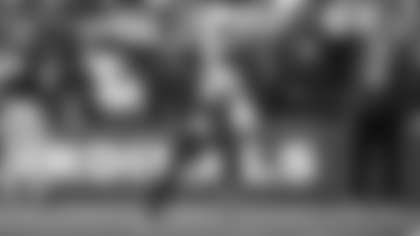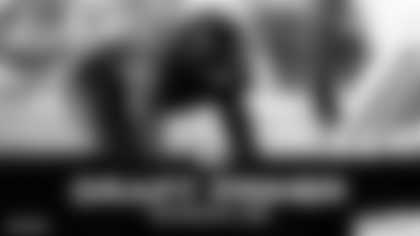Veteran safety Yeremiah Bell (37), talking with teammate Antoine Cason during minicamp, spent two years working at a steel mill between high school and playing college football at Eastern Kentucky.
Every Sunday afternoon for two years, Yeremiah Bell dropped whatever he was doing at 12:30 p.m., found a spot on his mother's couch in Wincester, Ky., and turned on The Roy Kidd Show.
It was often the only TV he watched all week.
Kidd was a local coaching legend at Eastern Kentucky University, a quick 20-mile drive from where Bell grew up. Sundays around the Bell house were spent relaxing and recuperating from the week. Family would come over to shoot the breeze and play cards. They'd cook. They'd laugh.
But just after lunchtime, Bell, who spent his weeks working in a steel mill after playing football in high school, would find his way to the couch, and without him knowing it, he'd be recruited by Kidd. Bell watched religiously. When a high school teammate, Danny Thomas, became a regular on the program Bell got sucked into Kidd's show like a child watching cartoons on Saturday morning.
One Sunday something changed inside Bell's mind. He got off the couch after Kidd's show determined to play college football. He had to get out of the mill first.
"He always talked about how he'd work his way through college and get to the pros," said Emery Crawford, a friend of Bell's whom he
met at the mill. "Everybody just thought he was talking. We didn't know he was as good as he was.
"He'd say, 'One of these days I'm going to make it to the big leagues.' I said, 'Son, I hope you do, but I've heard it before.'"
Bell kept telling Crawford and everyone else at the mill about his plan to work until he made enough money to pay for his freshman year at Eastern Kentucky. Then he'd walk on the football team and earn a scholarship, Bell would say.
After graduating from George Rogers Clark High School without any scholarship offers, Bell wasn't sure which path his life would take, but he knew he needed to find a job. Life after school wasn't about his parents supporting him, Bell told himself. While his friends bounced from job to job, Bell wanted to find a steady income.
A friend eventually got him hired at the mill, where he started working second shift, 4:30 p.m. to 3 a.m.
"That was hard on me at first, being right out of high school," Bell said. "I'm missing my whole day."
He was eventually moved to first shift and a more normal 6 a.m. to 4:30 p.m. schedule, making guard rails and tunnel liners. It was tedious and grueling work, lifting pieces of sheet metal that weighed between 80-90 pounds onto a machine which corrugated them, and then lifting the metal again, off the machine.
With his ear plugs in, Bell would scream across the machines just to have a conversation with his co-workers like Crawford. They've stayed friends all these years. Crawford's daughter wears No. 8 when she plays softball, just like Bell did in college.
"I had a fun time with the job," he said. "You put your head down and work. You got an order, it might be 150 pieces and you just run that order, making sure they're the right size, pull them out, change the machine and start on the next order.
"For some reason that job stuck with me. There are a lot of good people and I knew I had to make some money."
Bell finally saved enough money after two years in the mill and enrolled in Eastern Kentucky. He called Kidd weekly, asking when tryouts were being held.
"I know I had to give them a headache," Bell said. "I bugged them to death."
Bell hadn't played organized football in two years. At walk-on tryouts he was up against 18-year-olds fresh out of high school. Bell remembers watching their technique in awe. For two years, from that afternoon he turned off The Roy Kidd Show and set his mind on playing college football, he looked forward to tryouts. And now doubt was washing over him.
He'd grown out of his high school football equipment and showed up at tryouts with borrowed cleats two sizes larger than his size 11½ feet. He still ran the 40-yard dash in 4.5 seconds.
"That's all I needed to see," Kidd joked. "I told the coach, 'He can come out right now.' "
Of the 25 guys who tried out for Kidd, only two made it – and the other besides Bell soon quit. Bell's perservencace surprised his mother, Polly Bell, because the reason Yeremiah had played in high school was only because his friends did.
"It was kind of a shock to me when he said football," she said. "To me, he didn't have the football size but he was determined to play football.
"But never in a million years did I think he was going to the NFL."
College threw one hurdle after another at Bell, who suffered from clubfeet as a child and was told he'd never run. The 20-year-old freshman basked in the atmosphere, having fun going to class and living the college life. His football career wasn't developing as smoothly.
After redshirting his freshman year, Bell suffered a scare during two-a-day practices as a sophomore, enduring full-body cramps that lead to a three-day hospital stay. After getting out of the hospital, Bell told Kidd he was quitting football.
Kidd only waited a couple of days before trying to convince Bell otherwise.
"I called him up and said, 'Are you ready to come back?' and he said yes he was," Kidd remembered. "And back he came.
"You don't have speed like that. You don't just get that speed all the time."
Bell established himself as one of the premier defensive backs in Division I-AA, as it was called at the time. He was named an All-American and the Ohio Valley Conference defensive player of the year in 2001, and was a two-time All-Conference player heading into his senior season.
By then, the NFL had become a part of the conversation about Bell's future.
In Kentucky, every sport, including football, takes a backseat to basketball. It's as part of the bluegrass culture as horse racing, and Bell fell hard for hoops as a kid. He played outdoors during the summer at a park near his home. Even when he was at Eastern Kentucky, he'd find time to play.
Two weeks before his senior training camp was to start, Bell was outside playing pickup. On one play, he landed and his left leg hyperextended backward. Everyone around the courts heard the pop. Soon the park was silent and a crowd had gathered. Bell took one step and knew something was wrong. He ruptured his patella tendon. He knew his season was over. He knew the NFL was in doubt.
"I did. I did. I ain't gonna lie," Bell said.
But Kidd had more immediate concerns. Eastern Kentucky was primed for a run at the I-AA national championship but those hopes were dashed without Bell. The Colonels lost to Eastern Illinois, 25-24, midway through the 2002 season, which prevented EKU from winning a conference crown. A year before, Bell intercepted Tony Romo twice when the Cowboys' quarterback guided Eastern Illinois.
"The difference between us winning was him not being here," Kidd said.
Bell was "pretty down in the dumps" when he began rehabilitating, but found support close to him in his mother and Eastern Kentucky's trainer, Johnda Wireman.
Polly and Wireman played nice mom/tough mom. Polly showered her son with positivity, never doubting the NFL had closed its doors on Bell. Instead, Polly just revised her expectations, guessing he'd drop in the draft – or if he wasn't drafted, Bell would be signed as a free agent.
Wireman provided tough love, sometimes painfully tough.
When Bell's cast was finally taken off, it was up to Wireman to work on bending it – a painful task. But she didn't stop there.
"It was the worst thing ever," Bell said. "She helped me through the process, probably one of the worst years of my life. She helped me get through it even when I wanted to stop. There were days I just wanted to hang it up and be like I had enough. She wouldn't let me quit. She stayed on me.
"If I didn't have her, I'm serious, I might not be sitting here because she's done so much for me at the time. She came through like no other."
Wireman refused to give Bell a day off, even after the two would bicker back and forth about it. By February of Bell's senior year, Wireman had worked him back into playing shape. He was cutting and back pedaling. He was looking like a football player again.
But her biggest accomplishment during Bell's injury was rehabbing his ego.
"She would just run it through my mind," he said. "She would just be like, 'The NFL is still going to want you.'"
Every day she told Bell he'd land in the NFL, and after a while he started to believe her. Even his mother kept reaffirming him.
"I said, 'You know what? If it was meant for you to play football, someone's going to take you. I don't where you're going, but you're going somewhere,'" Polly Bell said.
Bell was drafted in the sixth round of the 2003 NFL Draft and spent his first season on the Miami Dolphins' practice squad. It took Polly about four seasons to grasp the fact that her son was in the NFL. Now entering his 11th season, Bell is still riding the wave that started on his mother's couch watching The Roy Kidd Show.
"I've done way more and lasted way longer than I ever thought I would," he said. "I wouldn't change a thing."
Sitting in Polly's home is a stack of VHS tapes, all with a different episode of Kidd's show. It's been about a year-and-a-half since she watched one, but she remembers the first time Bell was the featured guest.
"Everyone's at home hollering," she said.
She taped it, of course, and when Bell saw it for the first time, he felt his football circle start to complete itself.
"It was like a blessing," Bell said. "I could remember my friend on there and then I'm at home watching myself. I was like, 'Man, I dreamed about this and this is actually coming true.'"














